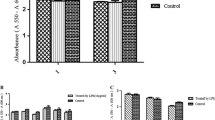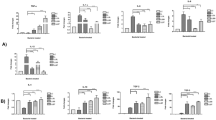Abstract
Lactobacillus casei (L. casei) is one of the probiotic strains that may influence intestinal injury and inflammation in nonspecific intestinal diseases. We aimed to evaluate the effect of cell-free Lactobacillus casei 21L10 supernatant (LC) on the cell line HT-29 challenged with lipopolysaccharide (LPS) in order to modulate production of NO, cell proliferation, and apoptosis. Cell line HT-29 was stimulated with LPS in the presence or absence of LC. Our results showed that LC from L. casei 21L10 did not affect the viability of unstimulated HT-29 cells line. HT-29 cell line treatment with LC caused significant decrease of LPS induced NO production after 3 h, and 24 h, but not after 48 h. Proliferation activity of LPS stimulated HT-29 cell line analysed with MTT assay significantly decreased after 24 h and 48 h, but not after 3 h. The majority of LPS stimulated HT-29 cell line treated with LC showed annexin V/PI positivity at 48 h survival, which corresponded to late apoptotic/necrotic cell features. The observed differences suggest that cell-free L. casei 21L10 supernatant could participate in attenuation of LPS-induced inflammation, and may exhibit anti-proliferative and pro-apoptotic/necrotic effects. This study provides pilot data for the further development of L. casei exoproducts as an anti-inflammatory or anti-proliferative agent for the treatment of inflammatory and cancer diseases in gut. However, more data is needed before final conclusions of L. casei cell-free supernatant’s efficacy can be drawn.



Similar content being viewed by others
References
Gorska, S., C. Sandstrom, J. Wojas-Turek, J. Rossowska, E. Pajtasz-Piasecka, E. Brzozowska, and A. Gamian. 2016. Structural and immunomodulatory differences among lactobacilli exopolysaccharides isolated from intestines of mice with experimentally induced inflammatory bowel disease. Science and Reports 6: 37613.
Kahouli, I., C. Tomaro-Duchesneau, and S. Prakash. 2013. Probiotics in colorectal cancer (CRC) with emphasis on mechanisms of action and current perspectives. Journal of Medical Microbiology 62: 1107–1123.
Choi, S.S., Y. Kim, K.S. Han, S. You, S. Oh, and S.H. Kim. 2006. Effects of Lactobacillus strains on cancer cell proliferation and oxidative stress in vitro. Letters in Applied Microbiology 42: 452–458.
Jaiswal, M., N.F. LaRusso, and G.J. Gores. 2001. Nitric oxide in gastrointestinal epithelial cell carcinogenesis: Linking inflammation to oncogenesis. American Journal of Physiology, Gastrointestinal, and Liver Physiology 281: G626-634.
Linehan, J.D., G. Kolios, V. Valatas, D.A. Robertson, and J. Westwick. 2005. Effect of corticosteroids on nitric oxide production in inflammatory bowel disease: Are leukocytes the site of action? American Journal of Physiology, Gastrointestinal, and Liver Physiology 288: G261-267.
Singer, I.I., D.W. Kawka, S. Scott, J.R. Weidner, R.A. Mumford, T.E. Riehl, and W.F. Stenson. 1996. Expression of inducible nitric oxide synthase and nitrotyrosine in colonic epithelium in inflammatory bowel disease. Gastroenterology 111: 871–885.
Vahora, H., M.A. Khan, U. Alalami, and A. Hussain. 2016. The potential role of nitric oxide in halting cancer progression through chemoprevention. Journal of Cancer Prevention 21: 1–12.
Nam, K.S., B.G. Ha, and Y.H. Shon. 2014. Effect of Cnidii Rhizoma on nitric oxide production and invasion of human colorectal adenocarcinoma HT-29 cells. Oncology Letters 9: 483–487.
Siegert, A., C. Rosenberg, W.D. Schmitt, C. Denkert, and S. Hauptmann. 2002. Nitric oxide of human colorectal adenocarcinoma cell lines promotes tumour cell invasion. British Journal of Cancer 86: 1310–1315.
Klapacova, L., G. Greif, M. Greifova, M. Tomaska, O. Hanus, and E. Dudrikova. 2015. Antimicrobially active lactobacilli from goats’ milk that do not produce biogenic amines. Journal of Food and Nutrition Research 54: 270–274.
Antoine, J.M. 2010. Probiotics: Beneficial factors of the defence system. The Proceedings of the Nutrition Society 69: 429–433.
Nagpal, R., A. Kumar, M. Kumar, P.V. Behare, S. Jain, and H. Yadav. 2012. Probiotics, their health benefits and applications for developing healthier foods: A review. FEMS Microbiology Letters 334: 1–15.
Lin, Y.P., C.H. Thibodeaux, J.A. Pena, G.D. Ferry, and J. Versalovic. 2008. Probiotic Lactobacillus reuteri suppress proinflammatory cytokines via c-Jun. Inflammatory Bowel Diseases 14: 1068–1083.
Ashraf, R., T. Vasiljevic, S.C. Smith, and O.N. Donkor. 2014. Effect of cell-surface components and metabolites of lactic acid bacteria and probiotic organisms on cytokine production and induction of CD25 expression in human peripheral mononuclear cells. Journal of Dairy Science 97 (5): 2542–2558. https://doi.org/10.3168/jds.2013-7459.
Rocha-Ramírez, L.M., R.A. Pérez-Solano, S.L. Castañón-Alonso, S.S. Moreno Guerrero, A. Ramírez Pacheco, M. García Garibay, and a C. Eslava. 2017. Probiotic Lactobacillus strains stimulate the inflammatory response and activate human macrophages. Journal of Immunology Research 2017: 1–14. https://doi.org/10.1155/2017/4607491.
Bermudez-Brito, Miriam, Sergio Muñoz-Quezada, Carolina Gomez-Llorente, Esther Matencio, Maria J. Bernal, Fernando Romero, and a Angel Gil. 2013. Cell-free culture supernatant of bifidobacterium breve CNCM I-4035 decreases pro-inflammatory cytokines in human dendritic cells challenged with salmonella typhi through TLR activation. Zostavil Fabrizio Mattei. PLoS One 8 (3). https://doi.org/10.1371/journal.pone.0059370.
Tiptiri-Kourpeti, A., K. Spyridopoulou, V. Santarmaki, G. Aindelis, E. Tompoulidou, E.E. Lamprianidou, G. Saxami, P. Ypsilantis, E.S. Lampri, C. Simopoulos, I. Kotsianidis, A. Galanis, Y. Kourkoutas, D. Dimitrellou, K. Chlichlia. 2016. Lactobacillus casei exerts anti-proliferative effects accompanied by apoptotic cell death and up-regulation of TRAIL in colon carcinoma cells. PLoS One 11. https://doi.org/10.1371/journal.pone.0147960.
Candela, M., F. Perna, P. Carnevali, B. Vitali, R. Ciati, P. Gionchetti, F. Rizzello, M. Campieri, and P. Briqidi. 2008. Interaction of probiotic Lactobacillus and Bifidobacterium strains with human intestinal epithelial cells: Adhesion properties, competition against enteropathogens and modulation of IL-8 production. International Journal of Food Microbiology 125: 286–292.
Grisham, M.B., K.P. Pavlick, F.S. Laroux, J. Hoffman, S. Bharwani, and R.E. Wolf. 2002. Nitric oxide and chronic gut inflammation: Controversies in inflammatory bowel disease. Journal of Investigative Medicine 50: 272–283.
Sah, B.N., T. Vasiljevic, S. McKechnie, and O.N. Donkor. 2016. Antibacterial and antiproliferative peptides in synbiotic yogurt—Release and stability during refrigerated storage. Journal of Dairy Science 99: 4233–4242.
Di Luccia, B., N. Manzo, L. Baccigalupi, V. Calabro, E. Crescenzi, E. Ricca, A. Pollice. 2013. Lactobacillus gasseri SF1183 affects intestinal epithelial cell survival and growth. PLoS One 8. https://doi.org/10.1371/journal.pone.0069102.
Escamilla, J., M.A. Lane, and V. Maitin. 2011. Cell-free supernatants from probiotic Lactobacillus casei and Lactobacillus rhamnosus GG decrease colon cancer cell invasion in vitro. Nutrition and Cancer 64: 871–878.
Elmore, S. 2007. Apoptosis: A review of programmed cell death. Toxicologic Pathology 35: 495–516.
Zhong, L., X. Zhang, and M. Covasa. 2014. Emerging roles of lactic acid bacteria in protection against colorectal cancer. World Journal of Gastroenterology 20: 7878–7886.
Iyer, C., A. Kosters, G. Sethi, A.B. Kunnumakkara, B.B. Aggarwal, and J. Versalovic. 2008. Probiotic Lactobacillus reuteri promotes TNF-induced apoptosis in human myeloid leukemia-derived cells by modulation of NF-kappaB and MAPK signalling. Cellular Microbiology 10: 1442–1452.
Kim, Y., S. Oh, H.S. Yun, S. Oh, and S.H. Kim. 2010. Cell-bound exopolysaccharide from probiotic bacteria induces autophagic cell death of tumour cells. Letters in Applied Microbiology 51: 123–130.
Pagnini, C., R. Saeed, G. Bamias, K.O. Arseneau, T.T. Pizarro, and F. Cominelli. 2009. Probiotics promote gut health through stimulation of epithelial innate immunity. Proceedings of the National Academy of Sciences of the United States of America 107: 454–459.
Zhu, Y., T. Michelle Luo, C. Jobin, and H.A. Young. 2011. Gut microbiota and probiotics in colon tumorigenesis. Cancer Letters 309: 119–127.
Cizkova, D., S. Devaux, F. Le Marrec-Croq, J. Franck, L. Slovinska, J. Blasko, J. Rosocha, T. Spakova, C. Lefebvre, I. Fournier, M. Salzet. 2014a. Alterations of protein composition along the rostro-caudal axis after spinal cord injury: proteomic, in vitro and in vivo analyses. Frontiers in Cellular Neuroscience 8. https://doi.org/10.3389/fncel.2014.00105.
Cizkova, D., F. Le Marrec-Croq, J. Franck, L. Slovinska, I. Grulova, S. Devaux, C. Lefebvre, I. Fournier, M. Salzet. 2014b. Modulation properties of factors released by bone marrow stromal cells on activated microglia: an in vitro study. Science Report. 4:7514. https://doi.org/10.1038/srep07514.
Devaux, S., D. Cizkova, J. Quanico, J. Franck, S. Nataf, L. Pays, L. Hauberg-Lotte, P. Maass, J.H. Kobarg, F. Kobeissy, C. Mériaux, M. Wisztorski, L. Slovinska, J. Blasko, V. Cigankova, I. Fournier, and M. Salzet. 2016. Proteomic analysis of the spatio-temporal based molecular kinetics of acute spinal cord injury identifies a time- and segment-specific window for effective tissue repair. Molecular and Cellular Proteomics 15: 2641–2670.
Funding
This study was funded by APVV 15–0613, APVV 19–0193, VEGA 1/0376/20, and VEGA 2/0010/21.
Author information
Authors and Affiliations
Contributions
All authors contributed to the study conception and design. Material preparation, data collection, and analysis were performed by Dasa Cizkova, Milan Cizek, Marcela Maloveska, and Marta Kmetova. The funding of the research work and the first draft of the manuscript was written by Dasa Cizkova, Marcela Maloveska, Vladimir Kmet, and Dobroslava Bujnakova, and all authors commented on previous versions of the manuscript. All authors read and approved the final manuscript.
Corresponding author
Ethics declarations
Conflict of Interest
The authors declare no competing interests.
Additional information
Publisher's Note
Springer Nature remains neutral with regard to jurisdictional claims in published maps and institutional affiliations.
Rights and permissions
About this article
Cite this article
Cizkova, D., Cizek, M., Maloveska, M. et al. Cell-Free Lactobacillus casei 21L10 Modulates Nitric Oxide Release and Cell Proliferation/Cell Death in Lipopolysaccharide-Challenged HT-29 Cells. Inflammation 44, 2419–2428 (2021). https://doi.org/10.1007/s10753-021-01512-0
Received:
Revised:
Accepted:
Published:
Issue Date:
DOI: https://doi.org/10.1007/s10753-021-01512-0




